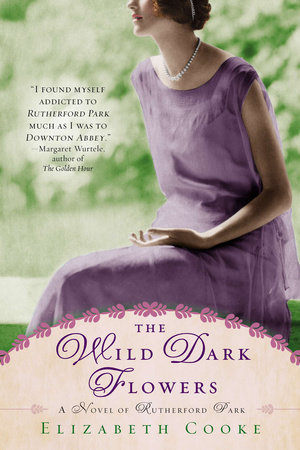READERS GUIDE
Questions and Topics for Discussion
1. INTRODUCTION
When May came that year in Rutherford, it was more beautiful than anyone could ever remember. More beautiful, and more terrible…
From inside their sprawling estate of Rutherford Park, the Cavendish family had a privileged perspective of the world. On the first morning in May, 1915, with a splendid view that reached across the gardens to the Vale of York, nothing seemed lovelier or less threatening. And yet…
At the risk of undoing the Cavendish name with scandal, William and Octavia Cavendish have been living a lie, maintaining a marriage out of duty rather than passion. But when their son Harry joins the Royal Flying Corps in France, the Cavendish family are forced to face the unavoidable truths about themselves, the society in which they thrive, and the secrets they can no longer bear.
In the wake of a terrible war, the emotional shifts between a husband and a wife, a wife and her lover, and a mother and her children, will shake the very foundation of the Cavendish family, and change the uniquely vulnerable lives of all who reside at Rutherford Park.
ABOUT ELIZABETH COOKE
Elizabeth Cooke lives in Dorset in southern England and is the author of twelve novels, including Rutherford Park. She has a long-established reputation for vivid storytelling and historical accuracy. Elizabeth’s family originate in the North Yorkshire Dales—Bronte country—and her grandfather worked at Kiplin Hall there, where he was one of the “downstairs” staff. His life, and Yorkshire itself—both its outstanding natural beauty and the industrial life of its mill towns and cities—were the inspiration for Rutherford.
DISCUSSION QUESTIONS
- The story opens with William Cavendish overlooking Rutherford. What does Rutherford symbolize for the Cavendish family, and how does its significance change, especially for Octavia?
- When the Cavendishes visit the de Ray’s, they have a conversation about their sons who are not in active posts: “[James is] in the Foreign Office. Gordon shan’t go… ” Octavia brings up Rupert Kent’s death, the group falls silent, and there is the presence of implicit guilt. How does guilt function as an influence in the story, both in this scene, and elsewhere?
- Harry’s plane crash and subsequent injury is narrated in chaotic terms: a “high-pitched jagged squeal…a scalding fire running through his thighs.” How do the raw physical experiences of Harry mimic the emotional experiences of his family?
- When Harry is being transferred, the author writes: “Pain was a peculiar thing; it was almost visible in the train—a writhing spirit that pressed itself down on the bodies.” Where do we see pain most acutely in the book—and where is it physical vs. emotional or mental?
- Harry considers the phrase uttered by the “drunk” officer, and he thinks: “The snuffing out of candles; and they were all candles. Particularly the young ones. Brief candles flickering in the dark.” Whose lives fulfill this description of “flickering candles” during wartime?
- Octavia thinks, “The world was at the mercy of men, and that was the entire problem.” Discuss how men and women cope with their problems differently in the story. How might the world be different if it were “at the mercy” of women?
- Harrison tells Nat he thinks that “God is looking somewhere else,” if there even is a god. Nat disagrees, and just after, is blown to bits. Sometimes it is said that the best men don’t survive wars—why is that? How are we made vulnerable by faith and goodness?
- When Louisa has to urge Jack to give up the Shire, they have a conversation about sacrifice. What do both ultimately lose, and how is this moment—giving up an innocent and unknowing creature—a symbolic reflection of that?
- After William’s heart attack, Octavia laments the way in which both she and her husband have dealt with their emotions: turning off feelings “as one might close off a faucet, or draw curtains against the dark.” What happens in the long and short term when the characters, and we, cut off or ignore our true feelings?
- When Harrison’s line is fired upon, he first sees the machine gun bullets as “sprouting seeds.” How does the author juxtapose these images—of bucolic Rutherford, the flora and fauna, new growth—with those of death? What comment does the book make on the circle of life, and how is it impacted by war?
- While William is recovering, he thinks back on the young prostitutes of his youth: “painted girls of sixteen and seventeen,” and he realizes he never considered their plight. He considers the “desperate callousness of youth…the mistakes, the greed.” Where do we see those mistakes and greed manifest in youth, like Harry? How do the older characters’ actions—like William, John, and Octavia—differ?
- Octavia finds herself very frustrated at the limitations of being a woman when she goes to meet Harry. In what ways does Octavia subvert the expectations of her sex and position, and in what ways does she bend to them?
- How does William change from the cold, pragmatic young man that he was, to the remove of his middle age, to his empathy later in the book? Most dramatically, he is sympathetic to Octavia regarding the fate of Gould—he seeks out information and, if subtly, comforts her. What prompted this evolution?
- The story begins with William at Rutherford and ends with the marriage of Mary and David Nash at Rutherford. How do the masters and servants affect each others’ lives in an imperative way, for better or worse? How might Ms. Jocelyn serve as a microcosm for society, in the manner that she obstructs the comingling of classes?
- Octavia says to William, “I wonder…if children ever appreciate what they do to their parents.” What does she mean? How do not only children, but lovers, spouses, friends, and comrades, not “appreciate” what they do to each other?

